Revealed: The Bush-Major conversations
- Published
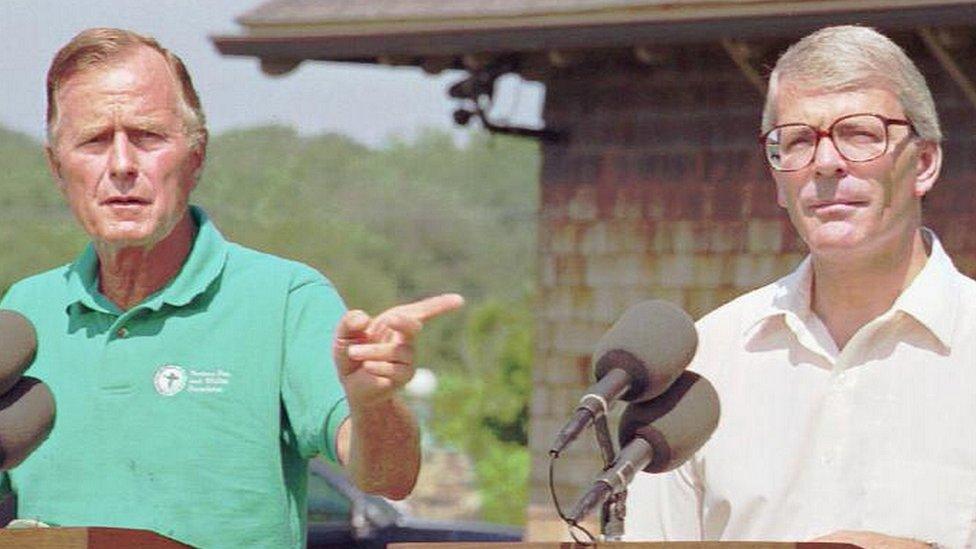
The two leaders discussed foreign affairs and their own domestic troubles
Sir John Major and George Bush senior overlapped in power between late 1990 and early 1993, and their close relationship is illustrated by transcripts of conversations obtained by the BBC.
It's tough at the top, whether you're the British prime minister or the US president, and it can be an irritating nuisance having to fight elections to stay there.
The two world leaders frequently commiserated with each other in their time in office on their unpleasant experiences of the democratic process, which neither appeared to enjoy.
"It's been a miserable five months here campaigning", President Bush said in March 1992 to Prime Minister Major, who replied "It's been miserable here too".
'Rooting for you'
Sir John told Mr Bush that he had walkabouts which "were really nasty and ugly" and the crowds were "horrendous".
He also gave the president his disgruntled view of the British media, that "the Conservative press here has been bloody" and "haven't been reporting our policy", while "the BBC has been appalling too", adding that "for what is supposed to be a public television service, it is not impartial at all".
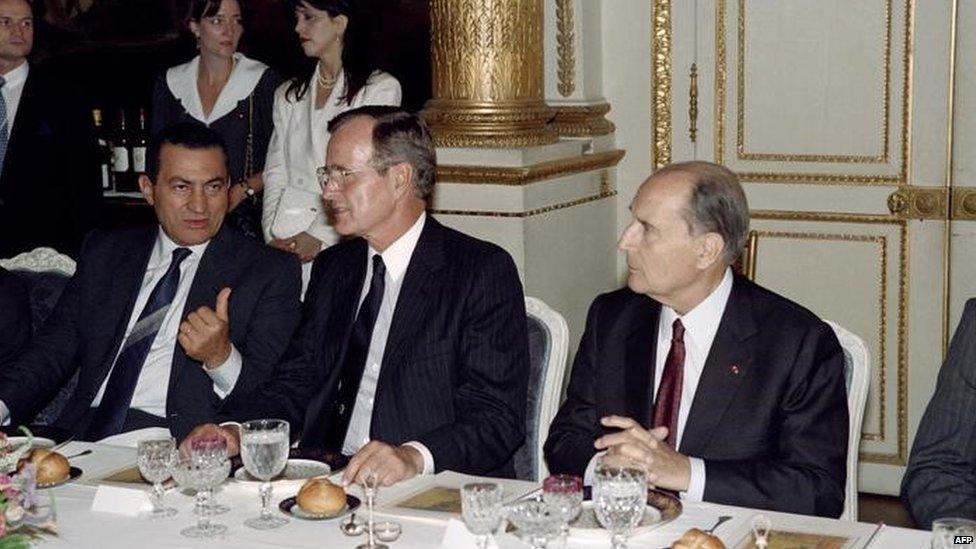
French president Francois Mitterand required "careful handling", according to the papers
Their political solidarity is clear. Mr Bush told Sir John in March 1992, shortly before the latter faced the Labour leader Neil Kinnock in a general election: "Obviously we're rooting for you, and it's very important that you win. You're ahead of Kinnock in the polls, right? That should help."
Records of their meetings and phone calls were obtained by a freedom of information request to the George Bush senior presidential library, external. They don't contain the same level of personal banter that featured in the Blair Clinton transcripts which I disclosed earlier this year.
But the Major-Bush documents do show that the pair had a close and affable relationship.
'Bitter and unpleasant'
At one point in November 1992 the president informed Sir John "I sent you a love letter yesterday", wanting to know if it had yet arrived. This was in response to a speech by the prime minister in which he strongly praised Mr Bush, who then told Sir John "you were very sweet".

The men sympathise over each other's local political difficulties. In October 1992 in the wake of the UK's traumatic exit from the European exchange rate mechanism, the president asked "How are things at home?", and Sir John replied "I've never known them to be so rocky, so testy, so bitter and unpleasant".
The prime minister added that "we've even had a seedy sex scandal that's run and run in the press" (a reference to his colleague David Mellor, external), and "I have the party conference next week, which will not be a barrel of laughs".
The transcripts reveal some of the discussions the two leaders had during the 1991 Gulf War. The president raised the question: "What about explicitly forcing Saddam Hussein out?" Sir John responded "I don't know if the United Nations would go for it".
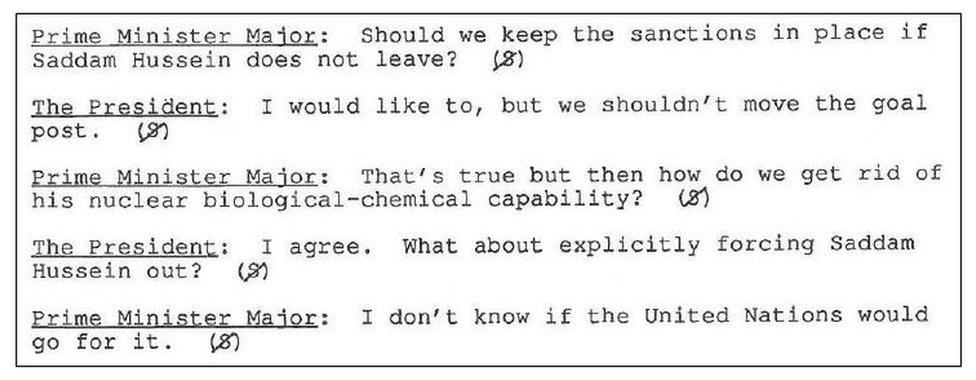
The prime minister also said: "It will be very bad if he stays". Mr Bush remarked: "I hate to see our clear military victory eroded by this messy situation". But they do not seem to reach a conclusion in this conversation.
They also often discussed the other persistent problems of the Middle East, lamenting the difficulties of making progress in the face of perceived "inflexibility". In one conversation the president remarked "We long for the return of Labor". His chief of staff John Sununu then butted in, presumably just to make matters entirely clear: "In Israel".
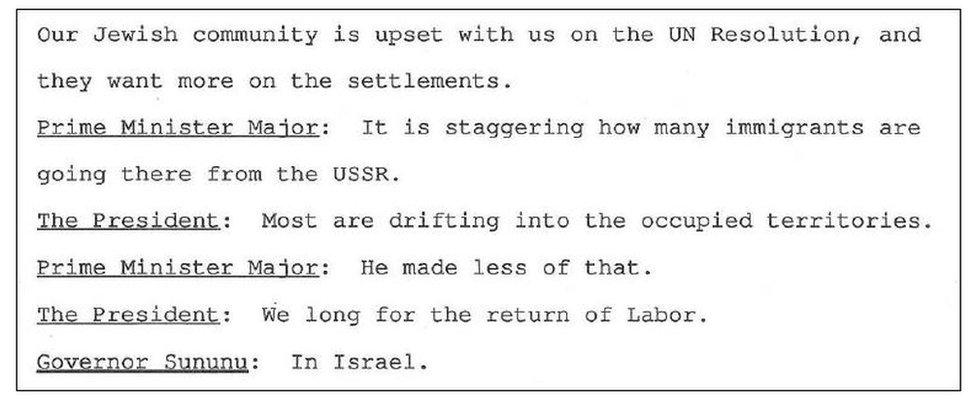
Another conflict discussed by the two men was the war in Bosnia, including the siege of Sarajevo, and the difficulties of intervention. The president said: "Our military guys ... showed me a map of the airport surrounded by hills full of crazy bastards who would rather die than compromise".
'Miffed'
Sir John concurred with caution over the use of ground forces: "Step by step we'll be dragged into an even bigger operation. That is our nightmare". The president also said he didn't want "to embark on an open-ended military commitment". He aimed to get relief through "while keeping our responsibilities grounded".
The pair talked about their best strategies for winning support for their positions from other world leaders. They particularly seemed to have problems with the French President, Francois Mitterand, on issues ranging from trade disputes to relations with Libya, describing him as "illogical", "miffed" and "grumpy", and requiring careful handling.
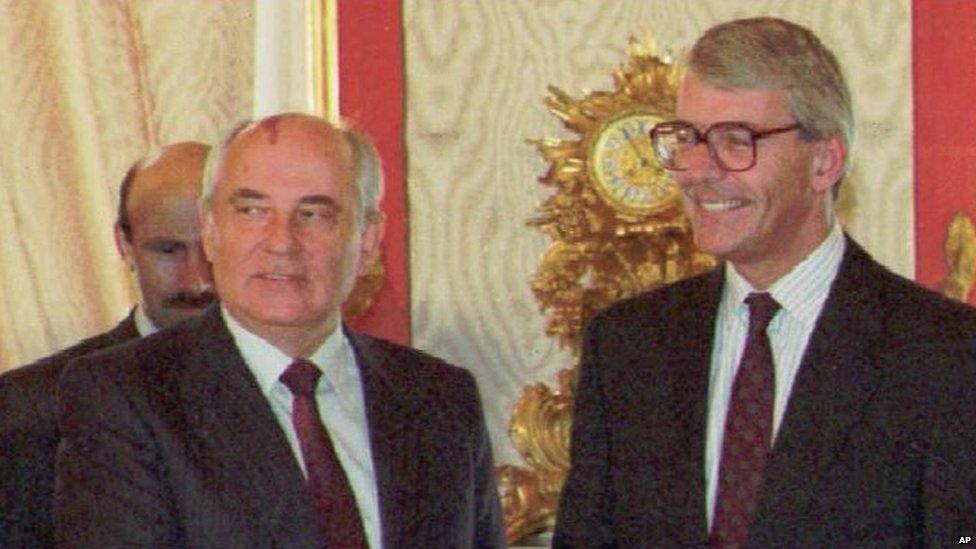
Sir John was seemingly in the dark about Mikhail Gorbachev's fate in 1991
On one occasion Sir John remarked "The French are angry at Britain, and me in particular, but that's everyday business in the Community."
Sometimes it is clear how even the world's most powerful leaders are in the dark about crucial fast-moving events. The two spoke on 19 August 1991, the day of the attempted coup against the Russian President Mikhail Gorbachev, agreeing that events were "very distressing", but frustrated because they both had no "inside info" and had failed to make any contact with Gorbachev.
From time to time Sir John told Mr Bush of his repeated problems with criticism from his predecessor, Margaret Thatcher, getting a sympathetic response from the president to his complaint that her opposition to defence cuts was "unhelpful".
However Mr Bush seems to have been admirably fair to his successor, Bill Clinton, who defeated him in the 1992 presidential election. Mr Bush reassured Sir John that Mr Clinton's knowledge was "impressive" and "he'll be good to work with".
The Bush-Major joint period in power, which began when Sir John took over from Margaret Thatcher in November 1990, ended when Mr Bush left office in January 1993.
You can follow Martin Rosenbaum on Twitter as @rosenbaum6
- Published7 January 2016